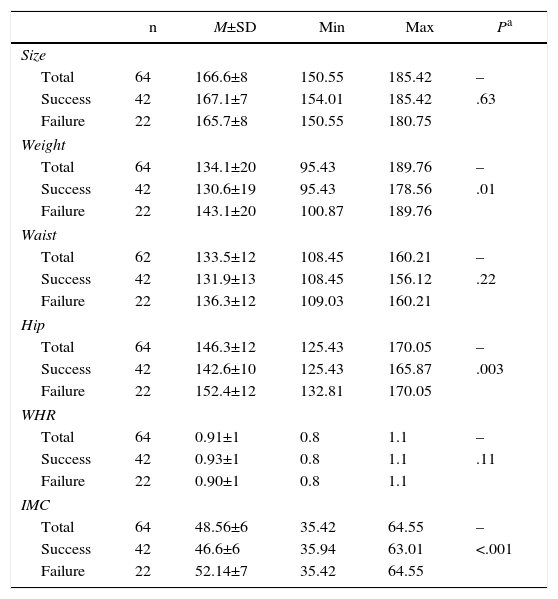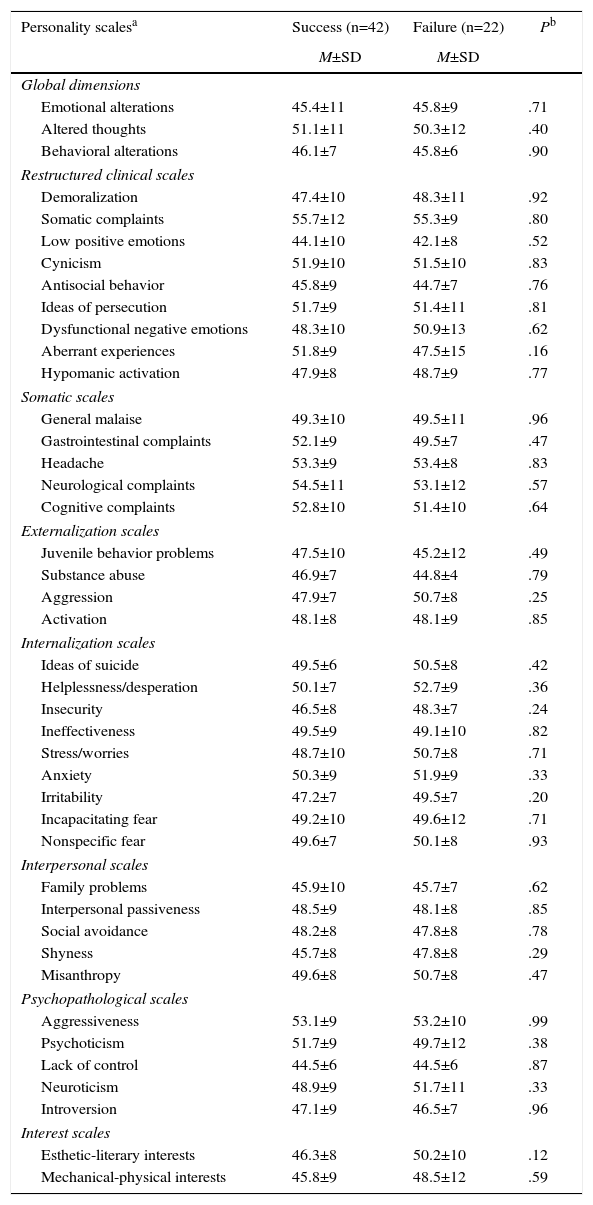Bariatric surgery is considered a more effective means of achieving weight loss than non-surgical options in morbid obesity. Rates of failure or relapse range from 20% to 30%. The study aims to analyze the influence of psychological variables (self-esteem, social support, coping strategies and personality) in the maintenance of weight loss after bariatric surgery.
MethodsA cohort study was conducted involving 64 patients undergoing bariatric surgery for 24 months. At the end of the follow-up period, patients were divided into 2 sub-cohorts classified as successes or failures. Success or favorable development was considered when the value of percent excess weight loss was 50 or higher.
ResultsNo statistically significant differences were observed between the 2 groups in any variable studied. All patients had high self-esteem (87.3 those who failed and 88.1 those who are successful) and social support (90.2 and 90.9). Patients who succeed presented higher scores for cognitive restructuring (57.1) and were more introverted (47.1), while those who failed scored more highly in desiderative thinking (65.7) and were more prone to aggression (50.7) and neuroticism (51.7).
ConclusionsHigh self-esteem and social support does not guarantee successful treatment. The groups differed in how they coped with obesity but the data obtained do not justify the weight evolution. In the absence of psychopathology, personality trait variability between patients is insufficient to predict the results.
El tratamiento de la obesidad mórbida mediante la cirugía bariátrica es más efectivo que las opciones no quirúrgicas. Las tasas de fracaso o recaída oscilan entre el 20 y el 30%. El estudio pretende analizar la influencia de determinadas variables psicológicas (autoestima, apoyo social, estrategias de afrontamiento y personalidad) en el mantenimiento de la pérdida de peso de los pacientes después de la cirugía bariátrica.
MétodosSe realizó un estudio de cohorte compuesta por 64 pacientes intervenidos mediante cirugía bariátrica con 24 meses de seguimiento. Al final del periodo, los pacientes fueron divididos en 2 subcohortes según fueran éxitos o fracasos. Se consideró éxito o evolución favorable cuando el valor del porcentaje de sobrepeso perdido era 50 o superior.
ResultadosNo se observaron diferencias estadísticamente significativas entre los 2 grupos en ninguna variable estudiada. Todos los pacientes tuvieron alta la autoestima (87,3 los que fracasan y 88,1 los que tienen éxito) y el apoyo social (90,2 frente a 90,9). Los pacientes que tuvieron éxito presentaron puntuaciones más altas para la reestructuración cognitiva (57,1) y eran más introvertidos (47,1); mientras que los que fracasaron anotaron más alto en pensamiento desiderativo (65,7) y eran más propensos a la agresión (50,7) y el neuroticismo (51,7).
ConclusionesUna alta autoestima y un alto apoyo social no garantizan el éxito del tratamiento. Los grupos difieren en la forma en que hicieron frente a la obesidad, pero los datos obtenidos no justifican la evolución del peso. En ausencia de psicopatología, la variación de los rasgos de personalidad entre los grupos de pacientes es insuficiente para predecir los resultados.









